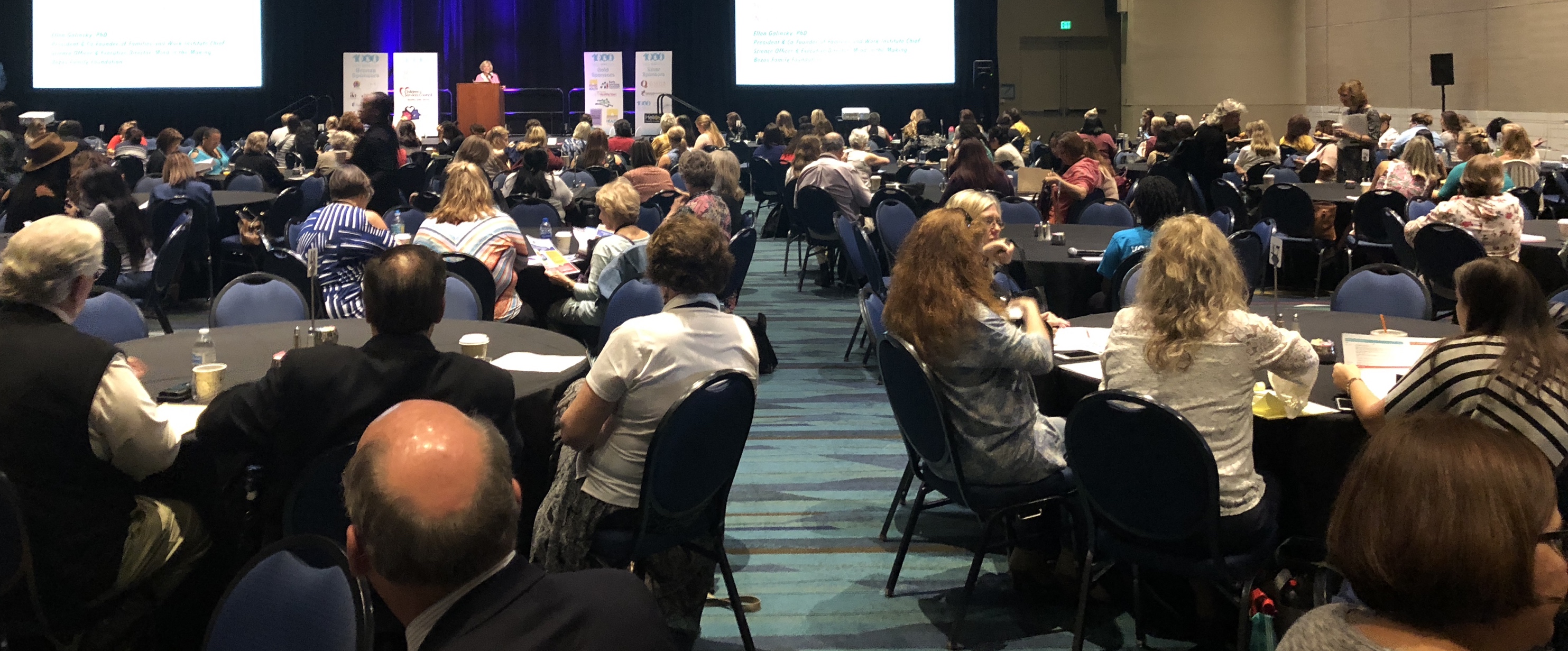Helping parents be the architects of their children's future
- September 27, 2018
- / Shannon Nickinson
- / early-learning

The second First 1,000 Days Conference in Florida continued on Sept. 27 in West Palm Beach with speakers who outlined the important role that parents play in their child’s development, and advice for advocates, practitioners and providers about how to support parents where they need it.
The conference was a mix of the science of early brain development, reinforcement of the importance of evidence-based practices that help build parents’ capacity to do better by their children, and maternal and infant health risks and best practices from the field to help manage those.
Ellen Galinsky is president and co-founder of the Families and Work Institute and is chief science officer at the Bezos Family Foundation. She is the author of the books “Six Stages of Parenthood,” “Ask the Children,” and “Mind in the Making.”
She has spent decades researching and writing about how children learn, what turns them off of the learning process and how they really feel about their parents' work-life balance.
Her talk highlighted research from Princeton University, New York University, the University of Minnesota, and others that all have focused on the way that the brains of young children develop. A key piece of healthy early brain development is the way that children build executive function.
“Executive function has been described as the air traffic controller of the brain,” Galinksy said.
It’s the part of your brain that helps you regulate your emotions, manage your behavior and set goals, solve problems and respond with mental flexibility when obstacles come up. Scientists call these: attentional control, cognitive inhibition, inhibitory control, working memory, and cognitive flexibility.
These skills are predictors of academic achievement, physical health, financial health, and emotional well-being, Galinsky noted.
In the critical first 1,000 days, promoting a child’s growing sense of autonomy is an important pre-skill for executive function.
Which is why “helicopter parenting” may be a scourge.
“If we are trying to make a difference for children, promoting life skills that promote executive function is a good place to start,” Galinksy said. “Because those skills can be changed.”
Galinksy noted there are seven skills parents can help reinforce that will develop executive function in a healthy way:
— Focus and self-control.
— Perspective taking. Think of it as not only as trying to see things from another person’s point of view, but also as seeing the forest for the trees. Helping children to see things differently allows them to solve problems on their own.
— Communicating.
— Making connections to other people.
— Critical thinking and promoting curiosity.
— Taking on challenges.
— Self-directed engaged learning.
These critical thinking skills are vital to building healthy adults. Because the power of positive thinking is not enough to change the way the brain works.
What does change the brain is not just having a wish. It’s having a wish, thinking about the outcome you want, what obstacles are in the way of you getting that outcome, and identifying the incremental steps you can take to overcome those obstacles and make that wish become real, Galinksy explained.
But none of these skills are learned in a vacuum. Human beings are social animals. And we learn best from interaction with others. Especially early interaction with a loving, engaged parent who is focused on us and responding to us.
“A baby’s brain is built for action,” Galinksy said. “It begins in the beginning, but it’s never too late.”
The idea of the brain as an empty vessel that you pour all of this knowledge into is a bit wrong, she said. The brain doesn’t learn the same or as well without interaction. For young children, play is a critical piece of the learning puzzle. Our children are not tiny learning bots. They learn best by doing — and by having fun while they are doing.
The way to help them make the most of what they can be is to help parents understand what builds a brain, and then helping them understand that they can do it.
Vroom, the early learning app and website developed by the Bezos Foundation, illustrates this idea beautifully in this video.
 CivicCon launches with a look at good growth in cities
CivicCon launches with a look at good growth in cities
 Building stronger brains one baby, one parent at a time
Building stronger brains one baby, one parent at a time
 SCI debuts commercial on Early Learning City
SCI debuts commercial on Early Learning City
 Entrecon: World class speakers and an opportunity to sharpen skills
Entrecon: World class speakers and an opportunity to sharpen skills
 PYP Quality of Life survey 2017
PYP Quality of Life survey 2017
 EntreCon Pensacola 2016: A look back
EntreCon Pensacola 2016: A look back
 Leadership tip: getting better employee takeaways
Leadership tip: getting better employee takeaways
 Leadership tip: be interested instead of interesting
Leadership tip: be interested instead of interesting
 Leadership tip: delivering difficult messages
Leadership tip: delivering difficult messages
 Brain Bags boost Arc, Early Childhood Court programs
Brain Bags boost Arc, Early Childhood Court programs